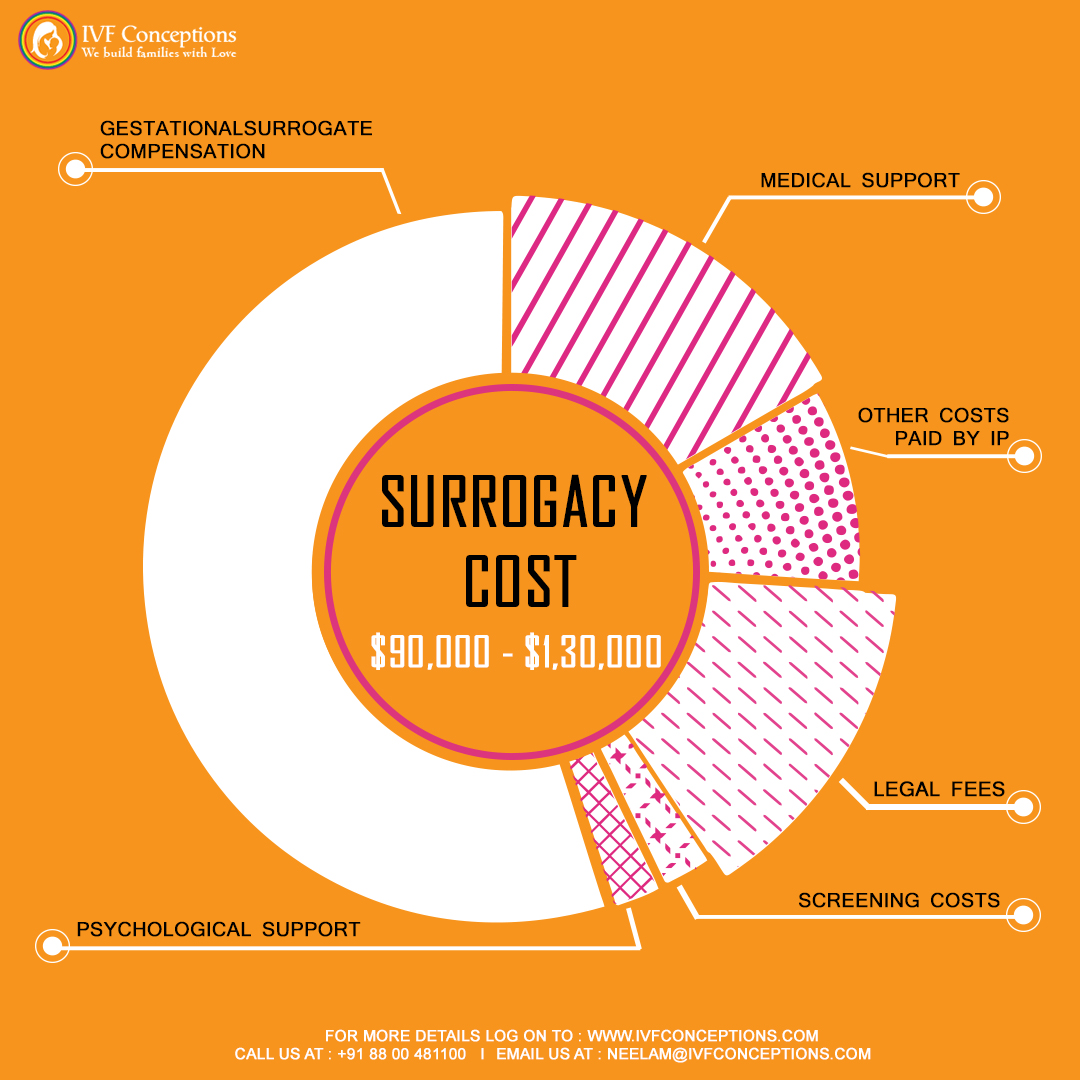Surrogacy in Cyprus- What You Need to Know!
Surrogacy in Northern Cyprus is a big choice for people wanting to have a child. It’s open to couples, single people, and same-sex couples. For 15 years, it’s been a top pick for those needing surrogacy. The services are safe and work well.
Let’s dive into the details of surrogacy in Cyprus and if it’s right for you.
- Book an online appointment: Get a free online consultation.
- Call\W:+91-8800481100 Email:neelam@ivfconceptions.com
Key Takeaways on Surrogacy in Cyprus
- Legal and Supportive Environment: Cyprus offers a good place for people facing fertility issues. It has legal and supportive conditions.
- Gestational Surrogacy Focus: The main type of surrogacy here is gestational, where the surrogate isn’t related to the child genetically.
- Structured Process: Finding an agency, medical checks, legal contracts, IVF, and monitoring the pregnancy are part of the process.
- Advanced Medical Facilities: Cyprus has top-notch medical facilities, favorable laws, and cultural acceptance. It’s an appealing choice.
- Inclusivity: Anyone can become a parent through surrogacy in Cyprus, including singles, couples, and unmarried couples.
- Considerations: Think about the emotional, legal, and medical aspects before starting.
- Rigorous Surrogate Selection: Surrogates in Cyprus go through a detailed selection and get support during pregnancy.
- Legal Recognition: Surrogacy is legal in Cyprus, but a parental order is needed to secure legal rights for the parents.
- Cost Variability: The cost of surrogacy in Cyprus changes based on medical, legal, and surrogate fees, and the Surrogacy program chosen.
- Same-Sex Couples Welcome: Cyprus welcomes all family types, including same-sex couples.
More Resources to Read:
Affordable Surrogacy Services in India: The Definitive Guide for Intended Parents
Top 5 Things To Know Before Going For Surrogacy Process
Affordable Surrogacy Options: What You Need to Know about Global Surrogacy Options
When to Choose Surrogacy Process: Intended Parents Guide
Surrogacy in Cyprus: An Overview
Gestational surrogacy lets a woman carry a pregnancy for someone else. It’s a way for people who can’t conceive or carry a pregnancy to have a biological child. A legal agreement outlines the terms between the intended parents and the surrogate.
Surrogacy is a choice for those facing fertility issues. Cyprus has laws that protect everyone involved, making it a good place for surrogacy.
Legal Framework in Northern Cyprus
The laws in Northern Cyprus, including Law 57-2014 and the Law on Human Cell, Tissue, and Organ Transport Regulation (607/2009), follow international standards. They protect intended parents and surrogates.
Interestingly, clinics in Northern Cyprus don’t need a Marriage Certificate or Medical Certificate to start the surrogacy process. But, the birth certificate lists both the biological father and the surrogate mother, with no way to remove the surrogate’s name.

Benefits of Surrogacy in Cyprus
Surrogacy in Cyprus has many advantages that draw people from around the world:
- High-Quality Medical Facilities: Cyprus has modern medical infrastructure and advanced fertility clinics. These clinics offer comprehensive reproductive services.
- Favorable Legal Environment: The legal system in Cyprus supports surrogacy. It ensures the rights and responsibilities of all parties involved. The process is streamlined, minimizing potential legal complications.
- Cultural Acceptance: Cyprus has a culturally accepting environment towards surrogacy. Society is generally open-minded and supportive of diverse paths to parenthood.
- Cost-Effective: Surrogacy in Cyprus is more affordable compared to other countries. This makes it an attractive option for budget-conscious intended parents.
Who is Eligible for Surrogacy in Cyprus?
Surrogacy programs in Cyprus are inclusive. They welcome a wide range of intended parents:
- Married Heterosexual Couples
- Unmarried Couples
- Single Individuals (Male or Female)
- Same-Sex Couples
There is no specific age limit for intended parents pursuing surrogacy in Cyprus. However, fertility clinics and surrogacy agencies may have their own guidelines.
Process of Surrogacy in Cyprus
The surrogacy process in Cyprus involves several key steps:
- Finding a Surrogacy Agency: Intended parents start by engaging a reputable surrogacy agency. The agency facilitates the entire process, connecting them with suitable surrogate mothers and coordinating medical and legal aspects.
- Medical Evaluations and Screening: Comprehensive medical evaluations and screenings are conducted for all parties. This ensures everyone is in good health and fit for the surrogacy journey.
- Legal Contracts and Agreements: Legal professionals draft and review contracts between the intended parents and the surrogate. These contracts outline rights, responsibilities, and financial arrangements.
- IVF Treatment and Embryo Transfer: In gestational surrogacy, eggs from the intended mother or an egg donor are fertilized with sperm from the intended father or a sperm donor. The embryos are then transferred to the surrogate’s uterus through IVF.
- Pregnancy and Birth: Once the embryo transfer is successful, the surrogate carries the pregnancy to term. Regular medical check-ups monitor the health of both the surrogate and the baby. At birth, the intended parents are legally recognized as the child’s parents.

Risks and Challenges of Surrogacy in Cyprus
While surrogacy in Cyprus offers benefits, it’s important to be aware of the potential risks and challenges:
- Emotional and Psychological Considerations: Surrogacy can be emotionally challenging for all parties involved. Intended parents may experience anxiety, attachment concerns, and complexities in the relationship with the surrogate.
- Legal and Ethical Issues: Although Cyprus has a supportive legal framework, surrogacy can still present legal and ethical challenges. Experienced legal professionals are essential to navigate these complexities.
- Medical Risks: As with any pregnancy, there are inherent medical risks. The surrogate mother may face complications during pregnancy and childbirth. Access to quality healthcare and appropriate insurance coverage is crucial.
- Popularity: Unlike some Eastern European countries, Cyprus is not as widely known for surrogacy. This may affect the availability of certain services.
Success Rates of Surrogacy in Cyprus
The success rates of surrogacy in Cyprus are generally encouraging. Clinics report a success rate of around 75% for egg donor surrogacy programs. This success is due to advanced medical facilities, skilled fertility specialists, and strict screening processes.
However, individual circumstances and medical factors can significantly influence the outcome.
Table 1: Success Rates Comparison
| Country | Success Rate (Egg Donor Surrogacy) | Medical Infrastructure Rating |
| Cyprus | 75% | High |
| Georgia | 70% | High |
| Ukraine | 72% | High |
Find Surrogate Mothers in Cyprus
Surrogate mothers in Cyprus go through detailed checks. They have background, physical, and psychological evaluations. They get ongoing support and monitoring during pregnancy.
They usually give birth in private hospitals. This gives the intended parents peace of mind. But, if the baby is born in Cyprus, the surrogate’s name and the biological father’s will be on the birth certificate. A parental order is needed to secure the intended parents’ legal rights.
Is Surrogacy Legal in Cyprus?
Yes, surrogacy is legal in Cyprus, but with some specific legal nuances:
Legal Aspects of Surrogacy in Cyprus
| Scenario | Legal Considerations | Next Steps |
| General Legal Status | Surrogacy is legal but not enforceable. The surrogate is the legal parent and must relinquish rights for adoption. | Commissioning parents need to apply for adoption via court order. |
| Single Surrogate Mother | Child is considered the offspring of the surrogate mother and intended father (born out of wedlock). Paternity established through acknowledgment or court order. | Surrogate must consent. The intended couple applies jointly for adoption. |
| Married Surrogate Mother | Surrogate’s husband is the legal father if the child is born through assisted procreation with his consent. | Both surrogate and husband must consent (after 3 months). The commissioning couple then applies for adoption. |
| Adoption Conditions | – Surrogate mother’s consent is mandatory. \n- Consent must be given 3 months after the child’s birth. \n- Child must live with the intended parents for 3 months. | Upon fulfillment, the adoption order is granted, making the intended parents the legal parents. |
Legal Framework and Process in Cyprus
Surrogacy in Cyprus is not legally binding, similar to the UK and Australia. The surrogate mother is seen as the child’s legal parent. To change this, the surrogate must give up her rights. Then, the commissioning parents can adopt the child through a court order.
If a single surrogate mother gives birth and then gives the child to the intended parents, Law 187/91 applies. The child is seen as born out of wedlock. It is legally the child of the surrogate mother and the intended father.
Paternity can be confirmed through:
- Voluntary acknowledgment.
- A court order.
Once paternity is confirmed, it cannot be changed. The intended father needs the surrogate’s consent to adopt the child. The intended parents must then apply to the court together for adoption.
The adoption process in Cyprus is covered by the Adoption Law 19(I)/1995. For an adoption to be granted, the surrogate mother must consent. This consent must come at least three months after the child’s birth. The child must also live with the adoptive parents for at least three months.

After an adoption order is given:
- The commissioning couple becomes the legal parents.
- The rights and duties of natural parents’ end.
- The child legally belongs to the adoptive parents, with no ties to others.
If the surrogate mother is married and the child is born through assisted procreation, her husband is the legal father. Both the surrogate and her husband must consent to the adoption. This consent must wait until three months after the child’s birth.
After consent, the commissioning couple can apply for joint adoption. An adoption order then gives them all the rights and duties of the child’s parents, making the child legally theirs.
Table 2: Legal Process Overview
| Step | Description |
| Surrogate Gives Birth | Surrogate is initially recognized as the legal mother. |
| Voluntary Acknowledgment | Intended father acknowledges paternity, securing initial legal rights. |
| Parental Order and Adoption | Intended parents apply for a parental order and then proceed with adoption. |
| Final Legal Status | Upon adoption, all rights transfer to the intended parents. |
How Much Does Surrogacy Cost in Cyprus?
The cost of surrogacy in Cyprus varies. It depends on several factors and the needs of the intended parents. Key costs include:
- Medical and Fertility Clinic Fees: Costs for IVF, embryo transfers, and medical services.
- Legal and Administrative Costs: Fees for legal advice, contracts, and court orders.
- Surrogate Compensation: Payments to the surrogate for her time, effort, and risks.
- Medical and Prenatal Care: Expenses for the surrogate’s medical care during pregnancy.
- Miscellaneous Expenses: Costs for travel, accommodation, and insurance.

Here are some common surrogacy programs and their costs:
- Self-Cycle Surrogacy Program: €56,000 – Includes one round of IVF with the intended mother’s eggs and a one-time embryo transfer.
- Egg Donor Surrogacy Program: €58,000 – Involves one round of IVF with an egg donor and a single embryo transfer.
- Unlimited IVF Attempts (Egg Donor): €75,000 – Unlimited IVF attempts with an egg donor until a successful live birth.
- Double Secure Plan for Two Parents: €136,000 – Unlimited IVF attempts with egg donor surrogacy for two parents until successful live births.
Table 3: Cost Breakdown of Surrogacy in Cyprus
| Program Type | Cost (€) | Description |
| Self-Cycle Surrogacy Program | €56,000 | IVF with intended mother’s eggs, one-time embryo transfer. |
| Egg Donor Surrogacy Program | €58,000 | IVF with egg donor, one-time embryo transfer. |
| Unlimited IVF Attempts (Egg Donor) | €75,000 | Unlimited IVF attempts with egg donor until successful live birth. |
| Double Secure Plan (Two Parents) | €136,000 | Unlimited IVF attempts with egg donor surrogacy for two parents. |
Inclusivity of Surrogacy in Cyprus
Surrogacy in Cyprus welcomes all types of intended parents, including:
- Same-Sex Couples: Cyprus is one of the few destinations that actively welcomes and supports surrogacy for same-sex couples.
- Single Parents: Individuals who wish to become parents through surrogacy are also welcomed in Cyprus.
- Heterosexual Couples: Cyprus offers various surrogacy options for heterosexual couples, whether married or unmarried.
Additional Resources to Read:
Can a Surrogate Mother Keep the Baby? Everything You Need to Know
Understanding Gay Surrogacy Costs – A Guide
How Much Do Surrogates Make – A Comprehensive Guide
Conclusion
Surrogacy in Cyprus offers a blend of advanced medical services, a supportive legal environment, and inclusivity for all types of intended parents. Whether you are a single individual, part of a same-sex couple, or a heterosexual couple, Cyprus provides a viable and appealing option for building your family through surrogacy.
While the journey involves navigating legal, emotional, and financial complexities, the end result—becoming a parent—makes it all worthwhile.
If you’d like to learn more about IVF, Egg Donation, or surrogacy services globally, check out the rest of our website at Georgia Surrogacy Agency. We offer legally secure and affordable surrogacy consulting services for FREE.
Get in touch for FREE SURROGACY CONSULTING:
Mobile: +91-8800481100 ( WhatsApp, Line, Viber)
Email: neelam@ivfconceptions.com

FAQs about Surrogacy in Cyprus
- Is surrogacy legal in Cyprus?
Yes, surrogacy is legal in Cyprus. However, surrogacy agreements are not legally enforceable, meaning that the surrogate mother is initially considered the legal parent until a parental order is granted and the intended parents can adopt the child.
- Who can pursue surrogacy in Cyprus?
Surrogacy in Cyprus is available to a wide range of intended parents, including married heterosexual couples, unmarried couples, single individuals, and same-sex couples.
- What is the difference between gestational and traditional surrogacy in Cyprus?
Cyprus primarily practices gestational surrogacy, where the surrogate mother has no genetic link to the child. In gestational surrogacy, the embryo is created using the intended mother’s egg (or a donor’s egg) and the intended father’s sperm (or donor sperm) and then implanted into the surrogate’s uterus.
- How much does surrogacy cost in Cyprus?
The cost of surrogacy in Cyprus varies. It ranges from €56,000 for a self-cycle program to €136,000 for a double secure plan. This plan includes unlimited IVF attempts with egg donor surrogacy until successful births.
- What is the success rate of surrogacy in Cyprus?
The success rate for egg donor surrogacy in Cyprus is about 75%. Success rates vary by individual circumstances and the fertility clinic.
- What legal steps are involved in surrogacy in Cyprus?
After the child is born, the parents must apply for a parental order. They also complete an adoption process to legally become the child’s parents. Legal professionals guide the process to ensure it follows Cyprus law.
- Are same-sex couples allowed to pursue surrogacy in Cyprus?
Yes, Cyprus welcomes all types of intended parents, including same-sex couples. Surrogacy programs are designed to help same-sex couples become parents.
- How are surrogate mothers selected in Cyprus?
Surrogate mothers in Cyprus go through a detailed selection process. This includes background checks, medical evaluations, and psychological assessments. They are chosen to ensure they are physically and emotionally fit for the role.

Highly esteemed, authoritative, and trusted professional with a 14-year of experience in international surrogacy. Advocate for Secure, Legal, and Affordable International Surrogacy.
Neelam Chhagani, MA (Counselling Psychology) and Holistic Infertility and Third-Party Reproduction Consultant.
Member of European Fertility Society, Best Surrogacy Blogger of 2020, with 300 dedicated blogs, and top contributor on Quora for Surrogacy.


Add Your Comment